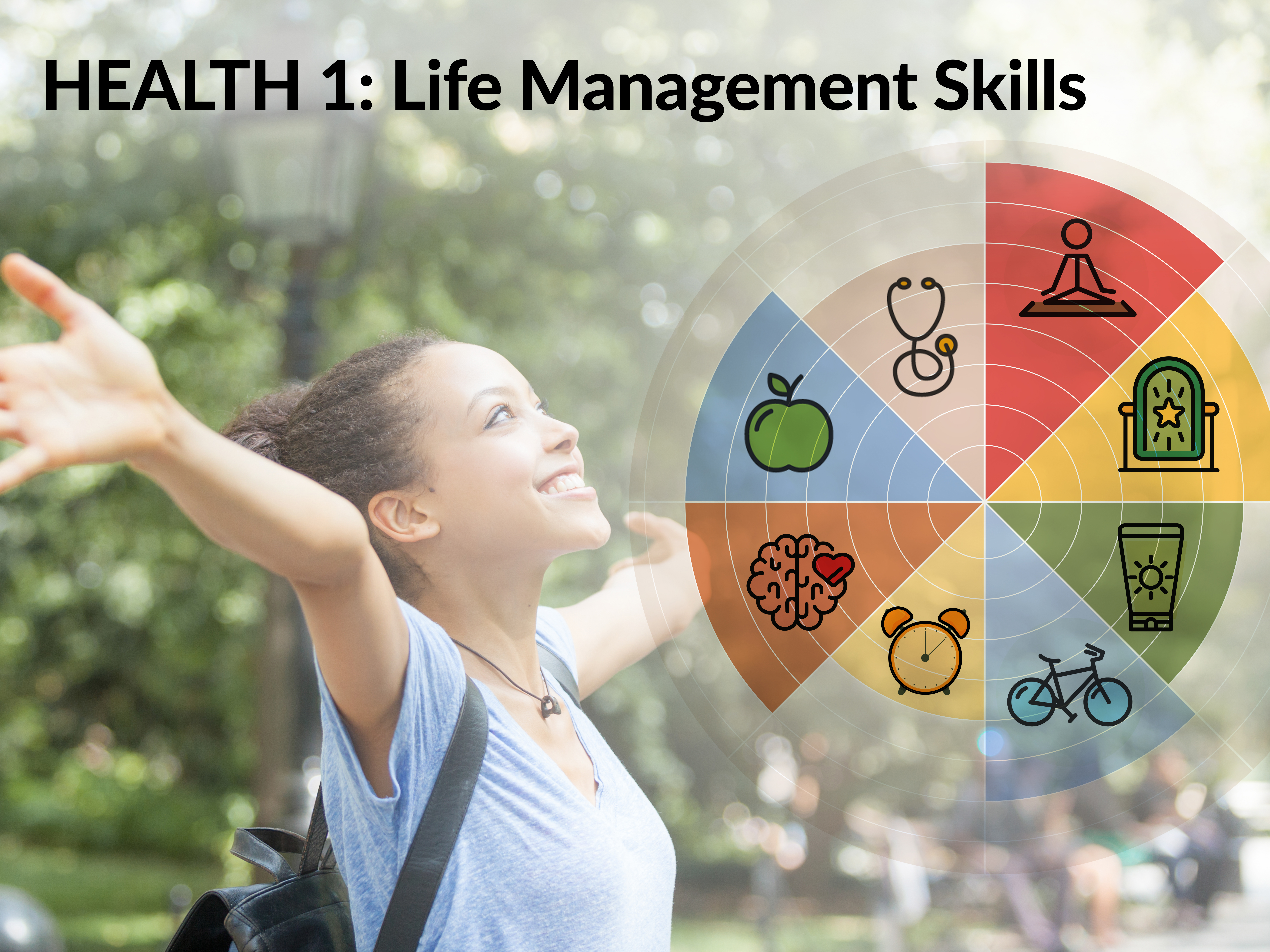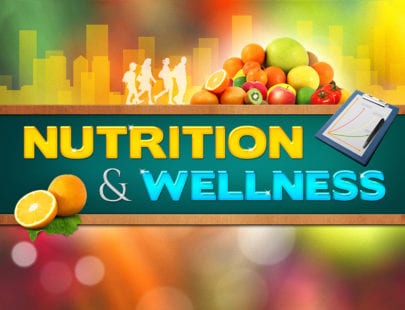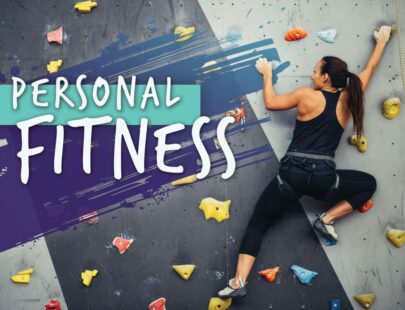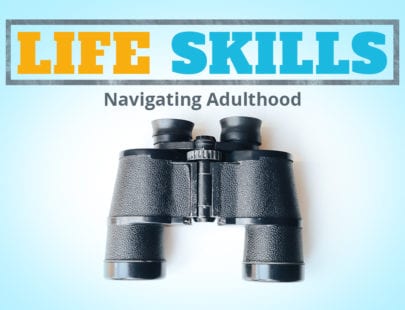
Health 1: Life Management Skills
Are you ready to unlock the secret to feeling your best – physically, mentally, and emotionally? In this course, you’ll dive into what it really means to be healthy, far beyond eating well and avoiding the common cold. From understanding your personal values to tackling peer pressure and media influence, you’ll gain the skills necessary to make smart choices for your mind and body. You’ll also explore ways to handle stress, deal with emotions, build strong relationships, and stay safe. With practical advice and simple tips, you’ll learn how to make smart choices that work for you. Let’s build your healthiest, happiest self – starting now!
Units at a Glance
Unit 1: Healthy, Defined
Over 2,000 years ago, the Roman poet Virgil said, “The greatest wealth is health.” This statement remains just as true today. Health is the most important aspect of our lives, but what does it really mean to be “healthy”? Here, we’ll explore the multiple dimensions of health, from physical well-being to mental, emotional, and social health, too. You’ll investigate how these dimensions of health are interconnected and how personal, family, and community choices shape your future. Get ready to gain the knowledge and skills you need to support a lifetime of good habits—and good health!
What will you learn in this unit?
- Define health and describe how the dimensions of health are interconnected
- Identify positive personal habits to promote physical health
- Distinguish between anxiety and depression and identify when to seek help for mental health concerns
- Apply strategies for naming and managing emotions
- Describe the relationship between social and physical health and the signs of healthy relationships
- Evaluate positive and negative impacts of advancing technology on human health
Unit 2: Know Yourself
You’re one of a kind! Shouldn’t your health goals be, too? Here, we’ll look at the many factors that contribute to your unique health needs and how you can plan accordingly to help meet those needs. We’ll start by exploring the changes happening to your mind and body during your teen years and the influence of your family on your health. Then, we’ll discover how your self-image, personality, and values help shape your choices. Finally, you’ll learn how to set personal health goals that are just right for your unique life and health needs. Get ready to build a healthy future that aligns with who you are and what you want out of life!
What will you learn in this unit?
- Describe the physical, emotional, intellectual, and social development that takes place during adolescence
- Explain the influence of family on all dimensions of personal health
- Identify how self-image and personal values influence health-related choices
- Distinguish between personality traits and compare types of motivation
- Develop SMART health goals that align with personal needs and priorities
Unit 3: Influences on Your Health
Have you ever thought about what shapes the choices you make every day? From the food on your plate to the way you see yourself in the mirror, your health is influenced by a mix of factors—some you can control and others you can’t. Here, you’ll explore how the people in your life, the environment, culture, government, and even the media you consume play a role in your health and well-being. Along the way, you’ll learn to recognize positive and negative influences and discover ways to make healthier choices. By the end, you’ll have the awareness to take charge of your health and be able to influence others to do the same!
What will you learn in this unit?
- Determine the influence of cultural norms on health-related behaviors
- Describe the impact of social determinants of health
- Recognize how public health policies and government regulations can influence health practices and behaviors
- Distinguish between types of peer pressure and develop strategies to respond
- Evaluate health messages delivered through media
Unit 4: Social, Mental, and Emotional Health
Your mind and body are so closely connected that it’s nearly impossible to have good health in one without the other! Here, we’ll explore the mind-body connection in depth as we unpack proven strategies for coping with stress and managing emotions in healthy ways. We’ll also dive into the world of relationships—what makes them healthy and how to spot when they’re not. You’ll learn key skills, like how to communicate clearly, handle conflicts without drama, and seek help for yourself or a friend or loved one who needs it. Get ready to empower yourself with practical strategies to nurture your mental, social, and emotional well-being!
What will you learn in this unit?
- Apply research-based strategies to handle stress
- Manage emotional wellness by naming feelings and finding healthy outlets for difficult emotions
- Identify the characteristics of healthy and unhealthy relationships
- Build positive relationships through clear, assertive communication, active listening, and conflict resolution skills
- Ask for and offer assistance to enhance the health of self and others
Unit 5: Disease Prevention
Sniffles, sneezes, aches, fevers—feeling under the weather is no one’s idea of fun, right? What if you could protect yourself and prevent illnesses in the first place? Here, we’ll explore how everyday choices can help keep your body strong and reduce your risk of many diseases. You’ll also learn how germs spread, how your lifestyle can promote or prevent illness, why early detection through screenings is so important, and how to access health care when you need it. Together, we’ll uncover practical ways to stay healthy and build disease-preventing habits for a lifetime!
What will you learn in this unit?
- Distinguish between acute and chronic conditions
- Describe the role of the immune system and of personal behaviors in avoiding infectious diseases
- Build healthy habits to support the prevention of chronic disease
- Identify the role of a healthy diet in disease prevention
- Navigate health care in order to seek medical help
Unit 6: Safety, Emergencies, and First Aid
Want to be a hero? Imagine being the person who knows exactly what to do in an emergency—whether it’s helping someone who’s choking, performing CPR, saving someone from an allergic reaction, or responding to an overdose. Here, you’ll learn these life-saving skills and more as we explore how to stay safe in everyday life and how to prepare for and respond to emergencies when they occur. By the end, you’ll have the confidence and knowledge to protect yourself and others. Who knows? The skills you learn here may just save someone’s life.
What will you learn in this unit?
- Identify personal safety strategies for everyday life
- Apply basic first aid in emergency situations
- Call 911 and perform CPR on an unresponsive person until medical help arrives
- Assist someone with an airway obstruction and respond to drug-related emergencies
- Recognize when professional services are required and how to prepare for and respond to emergency situations
Unit 7: Substance Use and Abuse
Whether you realize it or not, every day you’re exposed to both direct and unspoken messages about alcohol, tobacco products, and other drugs. While many messages warn against the dangers, other influences can make these habits seem harmless or even unavoidable. So, how can you cut through the noise and get to the truth? Here, we’ll explore the real effects of alcohol, tobacco, and other drugs, including why people use them and how they impact health and relationships. We’ll also break down the risks of addiction and substance misuse, giving you the knowledge to make informed choices, take control of your future, and confidently say no to harmful behaviors.
What will you learn in this unit?
- Identify risk and protective factors for substance use
- Summarize the consequences of alcohol use
- Identify the health risks associated with tobacco products, including e-cigarettes
- Compare and contrast prescription, over-the-counter, and illegal drugs in terms of their use and misuse
- Apply strategies to refuse drugs, including alcohol and tobacco products
Unit 8: Your Healthy Future
The choices you make today are shaping the path to your future, so now’s the perfect time to set yourself up with the skills to make it a healthy one! Here, you’ll learn how to make thoughtful decisions about your personal well-being, including sexual health and relationships. We’ll explore the skills needed to have open conversations about boundaries and consent and evaluate the risks of sexual activity with honesty and care. You’ll also find ways to build sustainable wellness habits as you age and take charge of your health for a lifetime. So, what are you waiting for? Your healthy future begins here!
What will you learn in this unit?
- Apply a decision-making process to health-related situations
- Communicate about consent and personal boundaries in a relationship
- Evaluate the risks associated with sexual activity in order to make informed choices
- Develop strategies to manage personal health and wellness as you age
- Take responsibility for health decisions and build healthy habits that support each dimension of health
Required Materials
Physical
- Art supplies
- Video recording device
- Writing supplies
Software
- Presentation software
- Word processing software
Other
- Helper(s)
Optional
- Audio recording device
- Calculator
- Camera
- Emergency supplies
- First-aid supplies
- Graphic design software
- Note-taking application
- Props
- Spreadsheet software
- Stuffed animal
- Timer
- Web design software



